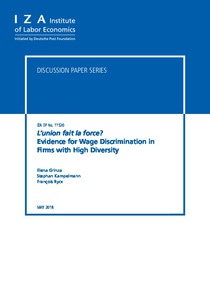L'union fait la force? Evidence for wage discrimination in firms with high diversity
"Measuring the economic impact of coworkers from different countries of origin sparked intense scrutiny in labor economics, albeit with an uncomfortable methodological limitation. Most attempts involved metrics that eliminate most of the economically relevant distances among different countries...
| Main Authors: | , , |
|---|---|
| Institution: | ETUI-European Trade Union Institute |
| Format: | TEXT |
| Language: | English |
| Published: |
Bonn
2018
IZA |
| Subjects: | |
| Online Access: | https://www.labourline.org/KENTIKA-19399184124911173669-L-union-fait-la-force?-evidenc.htm |
| _version_ | 1771659902326931457 |
|---|---|
| author | Grinza, Elena Kampelmann, Stephan Rycx, François |
| author_facet | Grinza, Elena Kampelmann, Stephan Rycx, François |
| collection | Library items |
| description | "Measuring the economic impact of coworkers from different countries of origin sparked intense scrutiny in labor economics, albeit with an uncomfortable methodological limitation. Most attempts involved metrics that eliminate most of the economically relevant distances among different countries of origin. The typical examples of such metrics are diversity indicators that divide the firm's workforce into blacks and whites, foreigners and natives, non-Europeans and Europeans, etc. We propose an entirely novel approach. It is based on the conversion of the qualitative information on individuals' countries of origin into an aggregate firm-level diversity indicator, built on the United Nations Development Programme's Human Development Index (HDI), a standard harmonized measure of cross-country variations that is available for virtually all the countries in the world. By resorting to rich matched employer-employee panel data for Belgium, we use this new aggregate measure to estimate state-of-the-art firm-level wage equations, which control for a wide range of observable and time-invariant unobservable factors, including variations in labor productivity between firms and within firms over time. Our results suggest that the majority of firms do not discriminate against foreigners. Yet, we find that firms with high diversity largely discriminate against them. The wage discrimination in high-diversity firms could be alleviated through a stronger presence of collective bargaining and/or efforts to de-cluster foreigners from low-HDI countries in these firms." |
| format | TEXT |
| geographic | Belgium |
| id | 19399184124911173669_c500597831da4361a2cebbb0983d06af |
| institution | ETUI-European Trade Union Institute |
| is_hierarchy_id | 19399184124911173669_c500597831da4361a2cebbb0983d06af |
| is_hierarchy_title | L'union fait la force? Evidence for wage discrimination in firms with high diversity |
| language | English |
| physical | 31 p. Digital |
| publishDate | 2018 |
| publisher | Bonn IZA |
| spellingShingle | Grinza, Elena Kampelmann, Stephan Rycx, François wage differential immigration migrant worker discrimination L'union fait la force? Evidence for wage discrimination in firms with high diversity |
| thumbnail | https://www.labourline.org/Image_prev.jpg?Archive=133134695131 |
| title | L'union fait la force? Evidence for wage discrimination in firms with high diversity |
| topic | wage differential immigration migrant worker discrimination |
| url | https://www.labourline.org/KENTIKA-19399184124911173669-L-union-fait-la-force?-evidenc.htm |

